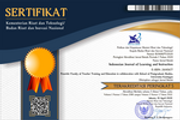THE USE OF PROJECT BASED LEARNING METHOD IN DEVELOPING STUDENTS' CRITICAL THINKING
Abstract
Full Text:
PDFReferences
Bell, F. H. (1981). Teaching and learning mathematics (In secondary school). USA: Wm.C. Brown Company Publisher.
Filsaime, D. K. (2008). Menguak rahasia berpikir kritis dan kreatif. Jakarta: Prestasi Pustakaraya.
Fisher, A. (2009). Critical thinking an introduction. Jakarta: Erlangga.
Hamzah, B. U. (2006). Teori motivasi dan pengukurannya analisis di bidang pendidikan. Jakarta: Bumi Aksara.
Jamaludin, D. N. (2013). Pengaruh project based learning (pjbl) terhadap berpikir kritis, berpikir kreatif, dan sikap ilmiah. Bandung: UPI.
Kosasih, E. (2014). Strategi belajar dan pembelajaran implementasi kurikulum 2013. Bandung: Yrama Widya.
McClelland, D. C., Atkinson, Clark & Lowell. (1953). The achievment motive. New York: Halsted Press.
Rahman, T. (2014). Makalah model pembelajaran project based learning. Bandung: Universitas Pendidikan Indonesia.
Sanjaya, W. (2009). Strategi pembelajaran berorientasi standar proses pendidikan. Jakarta: Kencana Prenada Media Group.
Winkel. W. S. (2005). Psikologi pengajaran. Jakarta: PT. Grasindo.
DOI: https://doi.org/10.25134/ijli.v2i01.1686
Refbacks
- There are currently no refbacks.
Copyright (c) 2019 Indonesian Journal of Learning and Instruction

This work is licensed under a Creative Commons Attribution-NonCommercial-ShareAlike 4.0 International License.

